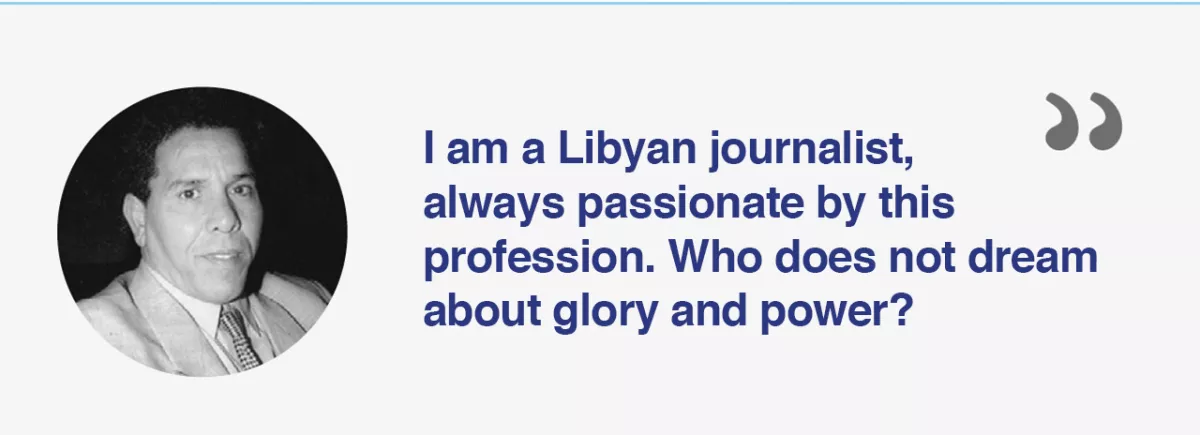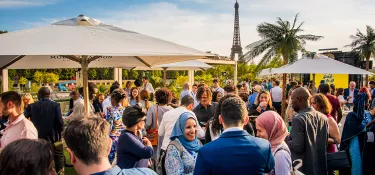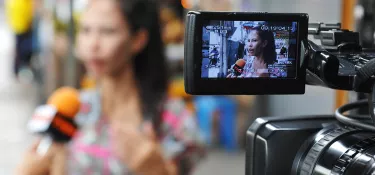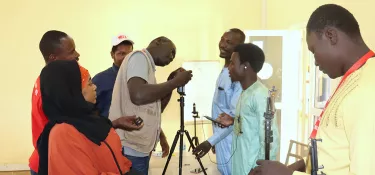
I am a Libyan journalist: Ibrahim Mohamad Alhaji
Related project
HiwarThe words of Ibrahim Mohamad Alhaji, journalist at Tripoli, Libya.
I am Ibrahim Mohamad Alhaji
I graduated in journalism from Sheffield Hallam University in 1998, and I have been working as a journalist in Tripoli since 1982.
My story begins in my childhood. Journalism to me was the most appealing way to achieve my ambition, which was to be famous. My imagination would run wild when I read articles by great journalists such as Haykal, Anis Mansour and other geniuses. I realised how famous they were, how much power they wielded, and how persuasive they were in everything they wrote. I imagined that one day I would claim the same throne, steering public opinion with my column in a renowned newspaper, with thousands of admirers reading my words.
This idea took root in me and dominated my thoughts. I would go to sleep and wake up with exactly the same goal.
After I finished school, I took the first step towards realising my obsessive dream by enrolling for a degree in journalism. I graduated from the university and found work as a journalist.
All my words and gestures conveyed this all-consuming ambition. There was no hiding what I wanted to be. My ambitiousness may have upset some of the people around me, especially the ones with more experience who had entered the field before me. So the first decision they made about me was to put me in the archive section of the newspaper I was working for.
That was never going to stop me from achieving my dream and attaining my goal. I wasn't going to give up on fame and power. I was certain that there was power in the 'fourth estate'.
I worked in the archive section and expanded my knowledge. I spent my working hours and more reading articles old and new that had been written for the paper over the years. A few years later, I moved up to the newsroom. My colleagues and I mechanically reformulated the dispatches we received from news agencies and correspondents. At that point, I started to ask myself, is this journalism? Is this what a journalist does? Just rewriting dispatches?
It dawned on me that I would never achieve my ambitions where I was. With several years of experience under my belt, I began working at another newspaper, in the hope that I would find what I was searching for there. The new job was encouraging, because it enabled me to write articles, express my point of view and proffer my opinion on subjects that interested people. I began to feel satisfied. My confidence was restored: one day I would reach my goal.
I was still young. I still dreamed of fame and power, and was convinced that I would make it. I admit that I pulled a few tricks of the trade to impose my authority on bosses who were frightened of the media. Where public authorities were concerned, I used to work for personal gain, to procure an advantage for myself as a journalist. I kept doing this until the day finally came, the day that ambition convinced me to write whatever I liked. I wrote an article that never saw the light of day, because this time the boss, my editor-in-chief, suspended me.
I realised then that there was no power in the fourth estate in my country. There was only one power: the power of the Leader. I grew up. I understood that authors who wrote about taboo subjects, of which there were plenty, ended up in jail and that journalism was a profession with pitfalls you could fall into at any moment. As a journalist, to be suspended was the least that could happen. Real disaster would be finding yourself in jail.
From then on I cursed the day I chose this career, which would never satisfy my thirst for fame and power. Years passed, in which I failed to free myself from the laws to which I was subject, or rather, to which others had subjected me. I spent years resigned to obeying the laws that ruled over journalism and journalists' freedom.
Suddenly and unexpectedly, a new dawn rose on journalism in my country, which erased all the red lines and left only the highest authority in place. I desperately wanted to turn back time and relive the start of my journalistic career, so that my star could shine again. This period was the best time for journalism in my country. Freedom of expression was largely guaranteed and the press properly fulfilled its role as a power, albeit not as the fourth estate. Then what people call the revolutions of the Arab Spring happened.
I was sure, certain, that these events were nothing but a conspiracy to destroy and fragment the country. But was I bound to defend the revolutionary cause and this spring, as they call it, and fight with my pen in their name against the people who used repression as a weapon against me?
What about journalistic ethics? What about the lessons that the troubles of my profession had taught me? I retained my impartiality until the moment I realised that everyone was against the Leader. Then I joined the movement with my pen – a pen that had been oppressed for years, unable to write what I wanted it to, saying only what others told it to say.
A new era began. The first year passed and journalism prospered. The printed press rose to over three hundred publications – there had never been more than twenty before. The second year saw a lot of new journalists emerge. Everybody wanted to be in the media, amateurs or professionals. There were no limits, no restrictions. Then it all changed. Lots of new leaders arrived. The red lines were redrawn, and this time there were more of them. New standards were imposed, too: either you write what they want, or you die. Where the punishment used to be prison, now it was death.
The journalists left the country. Only one newspaper remained in publication. Freedom of the press disappeared, leaving a bloodier and more terrifying freedom in its place. Now I am a retired journalist and an observer. I hope there will be a better future for the generations to come.
In order to sustain democratic debate in Libya, CFI launched Project Hiwar in early 2017 in partnership with the Crisis and Support Centre of the French Ministry of Europe and Foreign Affairs. The project creates a forum for the expression of different points of view on the Libyan press.
One session made up of four workshops was arranged in Tunisia. It was attended by twelve Libyan journalists, who travelled from Libya, Jordan, Turkey, Egypt and Tunisia.
This article forms part of the booklet I am a Libyan journalist, which collects a variety of pieces written by the journalists involved in Project Hiwar.



